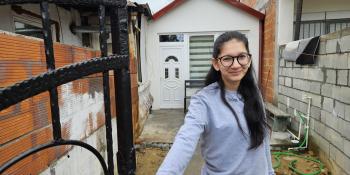
“We are no longer afraid of the cold”. Celebrating International Romani Day in North Macedonia.
Nada welcomes us with a smile on a cold April morning in her small house located in the narrow streets of Shuto Orizari, the only Roma municipality in Europe.
“We are no longer afraid of the cold. Our children are sleeping in a warm and dry place for the first time in their lives.
“We are grateful that Habitat turned our little house into a warm home, that you helped us legalize it and be our own,” shares Nada, currently unemployed.
She is the mother of a twelve-year-old girl, who goes to a local primary school, and an eight-year-old boy, who has to stay home due to his health condition and frequent hospital treatments.
“My husband, our two children and I, we all used to live in about twenty square meters: one room without insulation, with a cold concrete floor, and an unfinished bathroom. It was difficult for me to maintain hygiene, it was impossible to clean, I washed the dishes at the tap outside. It was cold.
“My son’s health condition requires constant care, daily inhalations, hygiene and warmth. Being part of Habitat Macedonia’s project, at first for the legalization of our home, and then for its refurbishment, gave us hope that we can raise our children in decent conditions.
“I can see the children’s health improving, hygiene is now as it should be, we have an adequate toilet and kitchen, and a space to sleep peacefully.”
Before the intervention, their small house had bare walls, no flooring, no plumbing in the kitchen and an unfinished toilet. Thanks to the renovation works, their living conditions have improved, and they can now enjoy a healthy home.
Hers is one of the 12 substandard homes undergoing refurbishment within the project ‘Sustainable Urban Development of Roma Communities’. A joint initiative of Habitat for Humanity Macedonia and the municipalities of Shuto Orizari and Veles, financed by the European Union.
Nada’s family shares the same problems as 60-70% of the estimated 50,000 Roma living in Macedonia – often recipients of social assistance. Lacking a stable income, they often live in substandard, illegal housing, without access to proper sanitation.
Over half of Roma families experience housing deprivation across the European Union, according to the EU Roma Survey from 20221. More than 70% of young Roma still leave school early, and Roma continue to have a much lower life expectancy than the general population.
Habitat Macedonia has been working for almost two decades on improving the housing conditions of the Roma population through various programs.
We focus our efforts on empowered participation, secure tenure, access to reliable and sustainable basic services as well as the eradication of energy poverty. On International Romani Day, let us remember that urbanization and improvement of living conditions is the basis for the social inclusion of Roma in the community, enrolment in education and improved health.